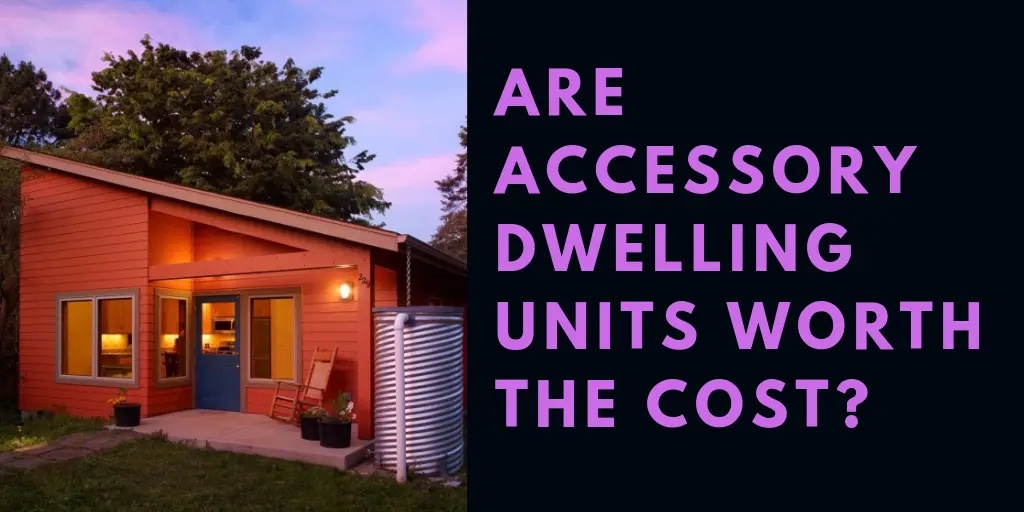If you’re considering building an accessory dwelling unit on your property, you might be wondering how to pay for it. While ADUs are cheaper to build than a regular single-family home, there’s still a large upfront cost. There are a few options to choose from in regards to financing for accessory dwelling units.
Home Equity Line of Credit (HELOC)
A Home Equity Line of Credit is a popular option for those seeking to build an ADU. This form of loan sets up your current home as collateral. It borrows from the available equity in your home and has a variable interest rate, which can be beneficial when compared to other loans. However, you can only qualify for a HELOC if the amount you owe on your home is less than the value of the home.
Typically you can borrow up to 85% of the home’s value with a HELOC. If you have a $600,000 home with a $200,000 balance on the mortgage, it would look something like this:
$600,000 x .85 = $510,000
$510,000 – $200,000 = $310,000, which would equal your max line of credit.
Additionally, banks will review the usual information like your credit score and history, income, debts, etc.
There are a few reasons you might not want to use this loan, depending on your circumstances. If you don’t have a stable income, keeping up with the monthly payments might be a bigger challenge for you. There are also a few fees associated with applying for a HELOC, so your upfront cost may increase.
Cash Out Refinance
Another option is the cash-out refinance. This option takes your existing mortgage and replaces it with one that’s value is more than your house. The difference can be used for things like home renovations or adding an ADU to the property. You still need to have equity built up in the home to utilize a cash-out refinance.
One benefit to this type of loan is that they have a lower interest rate than some of the other options, such as a HELOC or HEL. This is especially true if you purchased the home when mortgage rates were higher.
Mortgage interest payments are also tax deductible (unlike credit card interest). This means you can get a larger tax refund and reduce your taxable income.
Construction Loan
The other option is a construction loan. This loan differs from the others in that the project plan must be completed prior to receiving the loan. For instance, if you decide to add an ADU to the property, your home and future ADU will be assessed for value. If your property value starts at $500,000 with just your home and then increases to $750,000 after the ADU is built, that is the number the loan will be based on. You can typically get up to 95% of the newly assessed value.
While this loan might sound ideal, it’s usually harder to get than the previously mentioned loans. There are more variables that come into play since the plans for the unit must be completed prior to approval. You also need to have a predicted budget and proof of how you will pay back the loan. Keep in mind, there are different types of construction loans with different parameters and time frames.
We hope this provided a basic explanation of the most common financing options for accessory dwelling units. If you’re still wondering if building one of these units is worth it, check out the blog below!
If you found this article helpful, follow us on social media. We post daily tips to help you manage your own rental property:
Steve Welty
Subscribe to our Weekly Newsletter
Join the 5k+ homeowners receiving Local Law Updates and Landlord Tips. Delivered to your inbox every Saturday at 6am PST.
Share this:
Get in touch with us:
We make owning rental property easy.
Choose Your Next Step
Good Life Blogs
We believe that education is empowering.

SB 52: California May Ban AI Rent Pricing Tools
California’s SB 52 could ban landlords from using AI to set rent prices. Learn how this bill may impact your rental business and what actions you can take.

Trash Collection Fees Coming to San Diego Rental Properties
Trash collection fees are coming to San Diego landlords. Learn who’s affected, how much it will cost, and how to stay compliant.

How to Turn Vacant Rental Properties into Tax Deductions
Learn how to turn your rental property’s vacancy into potential tax deductions. Discover the rules, strategies, and tips landlords need to know.








